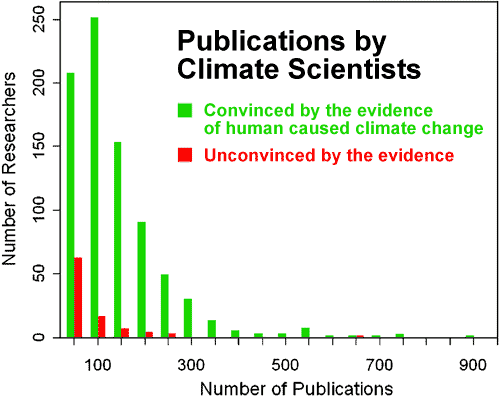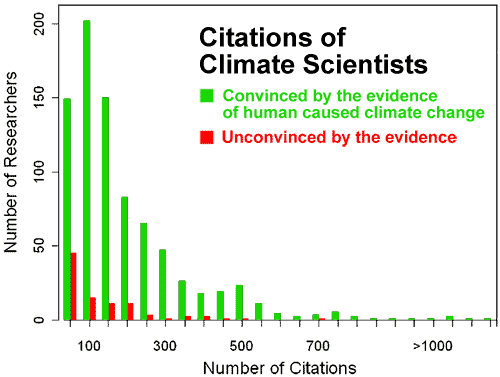How many climate scientists are climate skeptics?
Posted on 22 June 2010 by John Cook
There have been various surveys or petitions claiming that thousands of scientists are skeptical that humans are causing global warming. The thing is, when you peruse these lists, you find very few scientists who actually have expertise in climate science. So what do the experts think? A 2009 survey found that over 97% of actively publishing climate scientists are convinced humans are significantly changing global temperatures (Doran 2009). Now a new study has digged into this topic a little deeper and broader. As well as covering a larger number of climate scientists, they also researched how many papers each scientist published and how often their work was cited (Anderegg 2010). How many published climate scientists think most of recent global warming was due to human activity? Between 97 to 98%.
The results are strikingly consistent with Doran's earlier work. The overwhelming majority of climate experts think humans are causing climate change. Next, they dig a little deeper. They examine the number of publications by each scientist as a measure of expertise in climate science. What they find is the average number of publications by unconvinced scientists (eg - skeptics) is around half the number by scientists convinced by the evidence. Not only is there a vast difference in the number of convinced versus unconvinced scientists, there is also a considerable gap in expertise between the two groups.

Figure 1: Distribution of the number of researchers convinced by the evidence of anthropogenic climate change and unconvinced by the evidence with a given number of total climate publications.
An alternative measure of the quality and credibility of a scientist's contribution is the number of times their work is cited by other scientists. Again, there is a considerable gap between the number of citations of papers by convinced scientists and unconvinced scientists.

Figure 2: Distribution of the number of researchers convinced and unconvinced of human caused climate change with a given number times cited for each researcher’s average of the first through fourth most-cited papers.
Skeptics claim there is no scientific consensus, that there are many scientists who don't think humans are causing global warming. However, when it comes to climate experts, we have a numbers gap, an expertise gap and a credibility gap between the scientists convinced of human caused global warming and climate skeptics.































 Arguments
Arguments






























Latest Posts
.